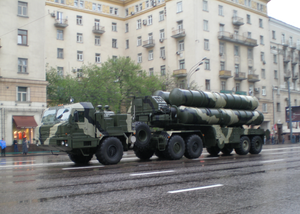

A TEL of a S-400 Triumf during a Victory Day Anniversary Parade Rehearsal on May 9, 2009 in Moscow....
RUSSIA sells S-300s and S-400s to the Arabs and Gives Israel the countermeasures to defeat it in Battle....
S-300, S-400, S-500: Missile Defense Marches Into The Future
November 1, 2010: Recently, for the first time, the S-
anti-aircraft missile systems that defend Russian Army
units, shot down ballistic missiles. The S-300B was moved around, as it would to support a mobile army, before going into firing position and knocking down two ballistic missile warheads. Two years ago, army S-300 units were transferred to the air force, which now controls all S-300/400 systems (except for a few belonging to the navy.) The air force S-300/400 units are mobile, but are rarely moved, except for those assigned to the army.
The S-300B is modified a bit for army use, but there are many variants on the basic S-300 (which arrived in the late 1970s as the SA-10). Earlier this year, Russia activated its first S-400 (also known as the S-300PMU-3, SA-21 or Triumf) anti-aircraft missile system, around Moscow. This new version of the S-300 pays particular attention to electronic countermeasures that the Americans might have, or be developing. The missiles are also physically larger and have longer range. Two years ago, Russia announced that the first S-400 had entered service around Moscow. But that didn’t actually happen, and development work continued. Recent test firings of the missiles were successful. Each S-400 battalion has eight launchers, each with two missiles, plus a control center and radar. The two year delay allowed more system components to be built, so two more battalions were in place around Moscow by the end of the year.
The S-400 is similar to the U.S. Patriot, and is expensive. Russia is unsure if they want to export S-400 right away, because of the advanced technology. Meanwhile, work is underway on the S-500, which is scheduled for deployment within five years. The S-400 missiles weigh 1.8 tons each and are 8.4 meters (26 feet) long and about 50cm (20 inches) in diameter. The missiles have a range of some 400 kilometers, and can hit targets as high as 100,000 feet. The missile has a 145.5 kg (320 pound) warhead. The target acquisition radar has a range of 700 kilometers.
The S-400 has over five times the range of the U.S. Patriot, weighs twice as much and claims the ability to detect stealthy aircraft. The S-400 also has an anti-missile capability, which is limited to shorter range (3,500 kilometers) ballistic missiles. That would mean a warhead coming in at about 5,000 meters a second (the longer the range of a ballistic missile, the higher its re-entry speed.)
The S-400 system actually has two types of missiles, one of them being a smaller, shorter range (120 kilometers) one. These are deployed four to a launcher, like all other S-300 systems. The S-400 has no combat experience, but U.S. intelligence believes that the tests these systems have undergone indicate it is a capable air defense weapon. Just how capable won’t be known until it actually gets used in combat.
Russia plans to buy up to 200 launchers (each with two or four missiles) by 2015, and phase out the older S-300 and S-200 systems. This would mean deploying at least 18 battalions in the next six years, and perhaps more than twenty. The S-400 is sometimes described as an improved version of the S-300. Basically, it is. This is how Russia prefers to develop weapons, making incremental improvements on a basic design, and doing so for decades if the system continues to be successful.
Russia currently has about 160 S-300 battalions, but about a third of them (the older models) are in storage.
Moscow, Russia: The Air Defense System of Moscow and the Russian Central Economic region will receive new weapons, including prestigious S-400 and S-500 air defense systems, Air Force Commander Colonel General Alexander Zelin said on Saturday.
“We have Air Defense System which protects Moscow and the Central Economic region; this system operates, accomplishes tasks and, of course, undergoes changes,” Zelin said.
Central economic region is located in the European part of Russia; it is the country’s major industrial region. Besides Moscow, major cities include Nizhny Novgorod, Smolensk, Yaroslavl, Vladimir, Tula, Dzerzhinsk, and Rybinsk.
“We will buy a significant number of S-400s before 2020. They will not just go to the five anti-aircraft missile regiments equipped with this system, but also to a much larger number [of regiments.] We are also discussing the [purchase of] S-500 anti-aircraft missile systems,” Zelin said.
The S-400 Triumf (SA-21 Growler) is designed to intercept and destroy airborne targets at distances of up to 400 kilometers (250 miles), twice the range of the U.S. MIM-104 Patriot, and two-and-a-half times that of Russia’s S-300PMU-2.
The system is also believed to be able to destroy stealth aircraft, cruise missiles and ballistic missiles, and is effective at ranges of up to 3,500 kilometers (2,200 miles) and speeds of up to 4.8 kilometers (3 miles) per second.
Regular S-400 battalion comprises at least eight launchers with 32 missiles and a mobile command post, according to various sources.
In 2009, Russia deployed S-400 air defense systems in the Far East to counter the potential threat posed by N. Korea’s missile tests.
So far, Russia has three S-400 battalions....
Russian TV has shown a statement of Foreign Minister Lavrov who declared that Russia opposes any type of military intervention in the Libyan conflict. The Eltsin years are over and I don't think that Russia will back down from this. So no UNSC resolution authorizing any US/NATO military intervention will be passed.
(e)SP_A0012_edited.jpg)

